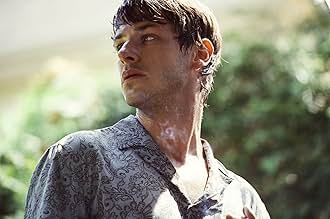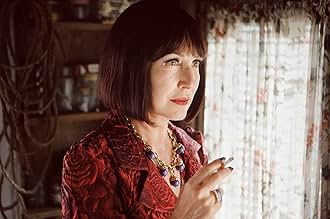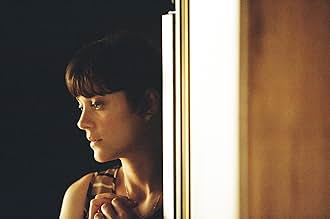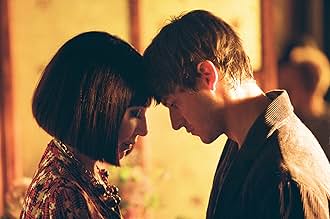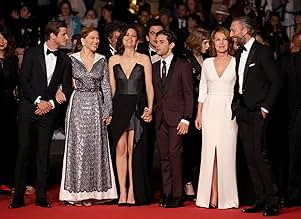Juste la fin du monde
- 2016
- Tous publics
- 1h 37m
IMDb RATING
6.8/10
26K
YOUR RATING
Louis (Gaspard Ulliel), a terminally ill writer, returns home after a long absence to tell his family that he is dying.Louis (Gaspard Ulliel), a terminally ill writer, returns home after a long absence to tell his family that he is dying.Louis (Gaspard Ulliel), a terminally ill writer, returns home after a long absence to tell his family that he is dying.
- Director
- Writers
- Stars
- Awards
- 19 wins & 39 nominations total
Antoine DesRochers
- Pierre Jolicoeur
- (as Antoine Desrochers)
- Director
- Writers
- All cast & crew
- Production, box office & more at IMDbPro
Featured reviews
b.r.i.l.l.i.a.n.t! I saw this movie at TIFF on Sept. 17 and it was the first Dolan film I've seen. It deserves the award it received at Cannes! Despite all the shouting and intensity, this film conveys with subtlety, suggestive dialogue and glances, the range of emotions felt by different members of a family when there has been an unexplained loss of another family member. Even though the main character, Louis, is still alive and returns to the family, they react as if he has returned from an unexpected death. They range from guilt, rage, idealization, and denial.The close-up filming style also reveals each family member's pain in intimate detail. Dolan is brilliant in his interpretation of that family's deep pain and Louis's coming to terms with not only his own impending death but the "death" the family already has had to deal with when he went away the first time.
Most of the critics did not like this movie. Their argument was that it had a great and promising cast, but that the combination didn't add up to much..a disappointment they said. Well, I do not agree at all. And after having seen "Mommy" I was convinced that the director couldn't have spoiled things going forward..if anything, he was even getting better. This is one of those movies that whispers something to you without you even knowing. A whisper about a dysfunctional family, wrong timing, memories trapped halfway between your throat and your mouth..Words left unsaid, and meanwhile, everyone eats, everyone smokes, lunch and dessert..white wine Not red. Old Home and the new.. An airport, a cup of coffee and a magazine. A song, a dance while the protagonist is standing outside looking inside himself while everyone is looking at him and staring, wondering why is he here and trying to read what he hasn't even written yet..They are all wondering whether he has the right to show up just like that after 12 years away from them. But isn't he the writer after all, the one with the burden..and the one with the choice? Should he or should he not? say something.. and why can't he leave just like he entered ...without disturbing the order of things. If only there was someone in the crowd who is able to understand his whisper, his slow gestures and his silent scream that keeps reverberating inside..and time strikes again and again. someone lifts him up under a gigantic blue sky. "Let's go for a drive". A drive down memory lane, a drive inside a family's heart, mind and soul. A highly emotional and daring movie, tensed, real, so real that it will take your breath away more than once. Highly recommended for its authenticity, great cast, pace, music, cinematography and the well deserved Jury Prize in Cannes 2016.
I read Jean-Luc Lagarce's play "Juste la fin du monde" a while back and it didn't really make an impression on me. So I was quite intrigued and just a tiny bit worried when I learned that Xavier Dolan, possibly my favorite contemporary film director, was adapting this to me impenetrable text into a movie.
I had confidence in Dolan's genius and was rewarded beyond expectations. The film is as magnificent as anything Dolan has created before. He has said in interviews that at first reading Lagarce's language- also off-putting for me- didn't impress him but that he discovered its power on second random reading. I'm grateful he did and that he has now shared this discovery with his audience with the aid of some truly superb acting performances.
The very first scene establishes everything with narration by protagonist Louis (Gaspard Ulliel), a successful author who is flying to see his family for the first time in over a decade. Louis is dying. Dolan hides Ulliel's face with shadowy lightning and a cap as well as utilizes close-ups so extreme you can't get a proper feel of a face. The close focus continues in the following scenes of Louis's family, only to very gradually move away as the film progresses.
Greeting Louis are his extravagant mother Martine (Nathalie Baye), his coolly detached younger sister Suzanne (Léa Seydoux), his dominant yet socially awkward older brother Antoine (Vincent Cassel) as well as Antoine's shy, even more socially awkward wife Catherine (Marion Cotillard).
Dolan tends to depict extreme personal conflict in his work, uniting his fiercely dramatic, richly colored and always unique visuals with raw scripts that seem to channel Ingmar Bergman's best work. This also occurs in "Juste la fin du monde".
If you looked at the movie without sound you could mistake it for a regular- if exceptionally well shot and acted- drama about a family uniting with the result of old wounds and conflicts emerging and taking over the scenes. This is indeed what basically happens here, but the dialog, to me so difficult to digest from the pages of a book, makes it all about what is left unsaid. Because even as extreme emotion takes over the characters and bursts out they still can't communicate with each other. Lines that one would expect to convey full, sincere, angry honesty are expressed through awkward, even incomprehensible dialog that only hints at the apparently troubled history of these people.
Louis, as mellow and conciliatory as he acts, seems to be a dangerous catalyst for his family, an antigen they all defend their nest against. This is endlessly fascinating and sold so well by the actors, each and every one of them marvelous. The title becomes darkly ironic, as Louis soon seems to find his impending death a minor problem in his severely dysfunctional family. He connects with Catherine, another outsider and someone who he hasn't met before this one day during which the whole film occurs. "How much time?" Catherine asks Louis, a question that together with the offhand mention of Louis's first boyfriend having passed away from "cancer" establishes the fatal backdrop of the AIDS epidemic.
At first glance "Juste la fin du monde" might seem like a melodramatic shouting match that emerges unfocused and aimless, but I ultimately find it urgently compelling and even insightful through its sustained aversion to a genuine unmasking of characters.
Lagarce wrote the original play in 1990, reportedly to examine his own mortality. He was dying himself at that time and finally succumbed to AIDS in 1994. There is a touching dimension to the script's nightmarish reunion as we sense Louis's need to come full circle, to rediscover his childhood and adolescence, even to assure himself that his already estranged family can survive after he's gone. Death is ever present, and instead of trivializing the personal conflicts it elevates them, because they are if nothing else moments of vitality for people not truly living.
I had confidence in Dolan's genius and was rewarded beyond expectations. The film is as magnificent as anything Dolan has created before. He has said in interviews that at first reading Lagarce's language- also off-putting for me- didn't impress him but that he discovered its power on second random reading. I'm grateful he did and that he has now shared this discovery with his audience with the aid of some truly superb acting performances.
The very first scene establishes everything with narration by protagonist Louis (Gaspard Ulliel), a successful author who is flying to see his family for the first time in over a decade. Louis is dying. Dolan hides Ulliel's face with shadowy lightning and a cap as well as utilizes close-ups so extreme you can't get a proper feel of a face. The close focus continues in the following scenes of Louis's family, only to very gradually move away as the film progresses.
Greeting Louis are his extravagant mother Martine (Nathalie Baye), his coolly detached younger sister Suzanne (Léa Seydoux), his dominant yet socially awkward older brother Antoine (Vincent Cassel) as well as Antoine's shy, even more socially awkward wife Catherine (Marion Cotillard).
Dolan tends to depict extreme personal conflict in his work, uniting his fiercely dramatic, richly colored and always unique visuals with raw scripts that seem to channel Ingmar Bergman's best work. This also occurs in "Juste la fin du monde".
If you looked at the movie without sound you could mistake it for a regular- if exceptionally well shot and acted- drama about a family uniting with the result of old wounds and conflicts emerging and taking over the scenes. This is indeed what basically happens here, but the dialog, to me so difficult to digest from the pages of a book, makes it all about what is left unsaid. Because even as extreme emotion takes over the characters and bursts out they still can't communicate with each other. Lines that one would expect to convey full, sincere, angry honesty are expressed through awkward, even incomprehensible dialog that only hints at the apparently troubled history of these people.
Louis, as mellow and conciliatory as he acts, seems to be a dangerous catalyst for his family, an antigen they all defend their nest against. This is endlessly fascinating and sold so well by the actors, each and every one of them marvelous. The title becomes darkly ironic, as Louis soon seems to find his impending death a minor problem in his severely dysfunctional family. He connects with Catherine, another outsider and someone who he hasn't met before this one day during which the whole film occurs. "How much time?" Catherine asks Louis, a question that together with the offhand mention of Louis's first boyfriend having passed away from "cancer" establishes the fatal backdrop of the AIDS epidemic.
At first glance "Juste la fin du monde" might seem like a melodramatic shouting match that emerges unfocused and aimless, but I ultimately find it urgently compelling and even insightful through its sustained aversion to a genuine unmasking of characters.
Lagarce wrote the original play in 1990, reportedly to examine his own mortality. He was dying himself at that time and finally succumbed to AIDS in 1994. There is a touching dimension to the script's nightmarish reunion as we sense Louis's need to come full circle, to rediscover his childhood and adolescence, even to assure himself that his already estranged family can survive after he's gone. Death is ever present, and instead of trivializing the personal conflicts it elevates them, because they are if nothing else moments of vitality for people not truly living.
Critics shouldn't be criticizing films they don't understand. Xavier Dolan's movies are extremely subtle in their acting and dialogues which I think makes it more difficult for non-French speakers to understand. This is especially true for this film since the movie is based upon the impossibility to communicate. That's probably why most of the bad reviews come from American newspapers. I mean, I'm French and I honestly admire non-French speaking fans of Dolan because subtitles aren't enough to communicate the subtlety of each word and tone. Aside from that it's only a matter of taste.
I agree on the fact that some characters are a bit stereotyped, especially during the scenes in which the whole family is gathered. However each actor has a scene in which they speak in private with Louis and that's when their characters get interesting. The film is aesthetically brilliant and allows you to understand things only eyes can communicate. The movie constantly creates an emotional tension, something I've rarely felt.
I agree on the fact that some characters are a bit stereotyped, especially during the scenes in which the whole family is gathered. However each actor has a scene in which they speak in private with Louis and that's when their characters get interesting. The film is aesthetically brilliant and allows you to understand things only eyes can communicate. The movie constantly creates an emotional tension, something I've rarely felt.
I think it's beautiful when creators explain more in shadows and silences than in dialogue and obvious visual cues. There is true brilliance to be found in the hidden and the unsaid; oftentimes, the truth comes in subtle ripples than in galvanized waves, and it's exceptional to come across true masters of the craft who are willing to respectfully handle such an intricate technique without becoming dull and overbearing.
Regrettably, such is not the case here.
Dolan tries to sweep us off our feet with anthropocentric framing and a flowing stream of ethereal brushings of color and emotion, something he does well, I can't deny him that. In the meanwhile though, he seems to be neglecting the actual plot which is painfully lacking on so many points, this movie is rendered into nothing more than a neophyte's attempt at a college- level, arthousy project.
Fortunate that the entirety of the cast is strong enough to redeem this effort by generously depositing spiritful performances, thankfully seeming to overcome the dire facts that the writing is listless, the plot is dormant, and the whole movie seems painfully mannered and conditional. So much so, that the viewer is bound to be left confused and, at times, attacked by the drip-fed, self-folding, monotonous interactions that ultimately serve to dress the movie with no pragmatic value at all.
In aiming for elegance and allure, Dolan fails to dish out a well-founded, coherent film, leaving us with nothing more than an unprogressive fable that tiptoes along the verge of deforming from 'suspended' to 'backwards'. And all very chaotically wrapped in out-of-place musical choices, not enhancing but rather debasing the scenes, pulling the viewer out of the experience in flabbergasted eye-rolls.
My point of view: Overlooking the feeble dialogue, overall repetitiveness, plot stagnancy and forced emotive filming techniques, I rather enjoyed the performances -- and here is where I rate this. It's Only The End of the World is a lifeless attempt, devoid of any true passion and it could have very easily broken down into oblivion the moment the end titles started rolling - if it weren't for Vincent Cassel's very last scene which, yet again, validates him as one of the Greats.
Lucky for me I will always have that to remember.
Regrettably, such is not the case here.
Dolan tries to sweep us off our feet with anthropocentric framing and a flowing stream of ethereal brushings of color and emotion, something he does well, I can't deny him that. In the meanwhile though, he seems to be neglecting the actual plot which is painfully lacking on so many points, this movie is rendered into nothing more than a neophyte's attempt at a college- level, arthousy project.
Fortunate that the entirety of the cast is strong enough to redeem this effort by generously depositing spiritful performances, thankfully seeming to overcome the dire facts that the writing is listless, the plot is dormant, and the whole movie seems painfully mannered and conditional. So much so, that the viewer is bound to be left confused and, at times, attacked by the drip-fed, self-folding, monotonous interactions that ultimately serve to dress the movie with no pragmatic value at all.
In aiming for elegance and allure, Dolan fails to dish out a well-founded, coherent film, leaving us with nothing more than an unprogressive fable that tiptoes along the verge of deforming from 'suspended' to 'backwards'. And all very chaotically wrapped in out-of-place musical choices, not enhancing but rather debasing the scenes, pulling the viewer out of the experience in flabbergasted eye-rolls.
My point of view: Overlooking the feeble dialogue, overall repetitiveness, plot stagnancy and forced emotive filming techniques, I rather enjoyed the performances -- and here is where I rate this. It's Only The End of the World is a lifeless attempt, devoid of any true passion and it could have very easily broken down into oblivion the moment the end titles started rolling - if it weren't for Vincent Cassel's very last scene which, yet again, validates him as one of the Greats.
Lucky for me I will always have that to remember.
Did you know
- TriviaFirst film directed by Xavier Dolan with only French actors in the cast. His previous films were all starred by Canadian actors. This film, however, was shot entirely in Canada.
- Quotes
Antoine Knipper: We think silent people are good listeners. But I shut up so people leave me alone.
- ConnectionsFeatured in Xavier Dolan: à l'impossible je suis tenu (2016)
- SoundtracksHome Is Where It Hurts
Written by Camille, Dominique Dalcan, Matthew Ker
Performed by Camille
Published by Blonde Music and Balulalo
Authorized by Warner Music Canada for Parlophone Music France
- How long is It's Only the End of the World?Powered by Alexa
Details
- Release date
- Countries of origin
- Official sites
- Languages
- Also known as
- It's Only the End of the World
- Filming locations
- Sainte-Dorothée, Laval, Québec, Canada(house interiors)
- Production companies
- See more company credits at IMDbPro
Box office
- Budget
- €6,900,000 (estimated)
- Gross worldwide
- $9,231,823
- Runtime
- 1h 37m(97 min)
- Color
- Sound mix
- Aspect ratio
- 1.85 : 1
Contribute to this page
Suggest an edit or add missing content

![Watch Bande-annonce [OV]](https://m.media-amazon.com/images/M/MV5BOWE2Nzg5NjctOWNhNi00MTEwLWIzOTMtOWQ2MWY1YjM5Y2JjXkEyXkFqcGdeQXRyYW5zY29kZS13b3JrZmxvdw@@._V1_QL75_UX500_CR0)
![Bande-annonce [OV]](https://m.media-amazon.com/images/M/MV5BOTExZGFjM2MtMTFhZC00Y2E3LWJiZGEtNzU4ODlhOGRhZDc0XkEyXkFqcGdeQXRyYW5zY29kZS13b3JrZmxvdw@@._V1_QL75_UX500_CR0)


